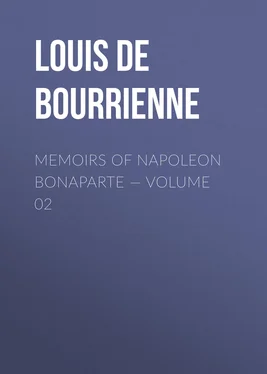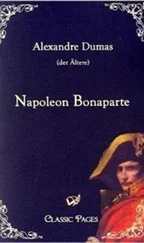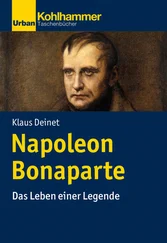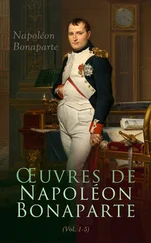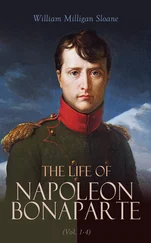Louis Bourrienne - Memoirs of Napoleon Bonaparte — Volume 02
Здесь есть возможность читать онлайн «Louis Bourrienne - Memoirs of Napoleon Bonaparte — Volume 02» — ознакомительный отрывок электронной книги совершенно бесплатно, а после прочтения отрывка купить полную версию. В некоторых случаях можно слушать аудио, скачать через торрент в формате fb2 и присутствует краткое содержание. Жанр: Биографии и Мемуары, История, foreign_edu, foreign_antique, foreign_prose, на английском языке. Описание произведения, (предисловие) а так же отзывы посетителей доступны на портале библиотеки ЛибКат.
- Название:Memoirs of Napoleon Bonaparte — Volume 02
- Автор:
- Жанр:
- Год:неизвестен
- ISBN:нет данных
- Рейтинг книги:3 / 5. Голосов: 1
-
Избранное:Добавить в избранное
- Отзывы:
-
Ваша оценка:
- 60
- 1
- 2
- 3
- 4
- 5
Memoirs of Napoleon Bonaparte — Volume 02: краткое содержание, описание и аннотация
Предлагаем к чтению аннотацию, описание, краткое содержание или предисловие (зависит от того, что написал сам автор книги «Memoirs of Napoleon Bonaparte — Volume 02»). Если вы не нашли необходимую информацию о книге — напишите в комментариях, мы постараемся отыскать её.
Memoirs of Napoleon Bonaparte — Volume 02 — читать онлайн ознакомительный отрывок
Ниже представлен текст книги, разбитый по страницам. Система сохранения места последней прочитанной страницы, позволяет с удобством читать онлайн бесплатно книгу «Memoirs of Napoleon Bonaparte — Volume 02», без необходимости каждый раз заново искать на чём Вы остановились. Поставьте закладку, и сможете в любой момент перейти на страницу, на которой закончили чтение.
Интервал:
Закладка:
We arrived at Milan on the 5th of May, by way of Laybach, Triest, Palma- Nova, Padua, Verona, and Mantua. Bonaparte soon took up his residence at Montebello, a very fine chateau, three leagues from Milan, with a view over the rich and magnificent plains of Lombard. At Montebello commenced the negotiations for the definitive peace which were terminated at Passeriano. The Marquis de Gallo, the Austrian plenipotentiary, resided half a league from Montebello.
During his residence at Montebello the General-in-Chief made an excursion to the Lake of Como and to the Lago Maggiore. He visited the Borromean Islands in succession, and occupied himself on his return with the organization of the towns of Venice, Genoa, and Milan. He sought for men and found none. "Good God," said he, "how rare men are! There are eighteen millions in Italy, and I have with difficulty found two, Dandolo and Melzi."
He appreciated them properly. Dandolo was one of the men who, in those revolutionary times, reflected the greatest honour upon Italy. After being a member of the great council of the Cisalpine Republic, he exercised the functions of Proveditore-General in Dalmatia. It is only necessary to mention the name of Dandolo to the Dalmatians to learn from the grateful inhabitants how just and vigorous his administration was. The services of Melzi are known. He was Chancellor and Keeper of the Seals of the Italian monarchy, and was created Duke of Lodi.
—[Francesco, Comte de Melzi d'Eryl (1753-1816), vice President of the Italian Republic, 1802; Chancellor of the Kingdom of Italy, 1805; Duc de Lodi, 1807.]—
In those who have seen the world the truth of Napoleon's reproach excites little astonishment. In a country which, according to biographies and newspapers, abounds with extraordinary men, a woman of much talent —(Madame Roland.)—said, "What has most surprised me, since the elevation of my husband has afforded me the opportunity of knowing many persons, and particularly those employed in important affairs, is the universal mediocrity which exists. It surpasses all that the imagination can conceive, and it is observable in all ranks, from the clerk to the minister. Without this experience I never could have believed my species to be so contemptible."
Who does not remember Oxenstiern's remark to his son, who trembled at going so young to the congress of Munster: "Go, my son. You will see by what sort of men the world is governed."
CHAPTER VI
1797.
Napoleon's correspondence—Release of French prisoners at Olmutz— Negotiations with Austria—Bonaparte's dissatisfaction—Letter of complaint from Bonaparte to the Executive Directory—Note respecting the affairs of Venice and the Club of Clichy, written by Bonaparte and circulated in the army—Intercepted letter of the Emperor Francis.
During the time when the preliminaries of Leoben suspended military operations, Napoleon was not anxious to reply immediately to all letters. He took a fancy to do, not exactly as Cardinal Dubois did, when he threw into the fire the letters he had received, saying, "There! my correspondents are answered," but something of the same kind. To satisfy himself that people wrote too much, and lost, in trifling and useless answers, valuable time, he told me to open only the letters which came by extraordinary couriers, and to leave all the rest for three weeks in the basket. At the end of that time it was unnecessary to reply to four- fifths of these communications. Some were themselves answers; some were acknowledgments of letters received; others contained requests for favours already granted, but of which intelligence had not been received. Many were filled with complaints respecting provisions, pay, or clothing, and orders had been issued upon all these points before the letters were written. Some generals demanded reinforcements, money, promotion, etc. By not opening their letters Bonaparte was spared the unpleasing office of refusing. When the General-in-Chief compared the very small number of letters which it was necessary to answer with the large number which time alone had answered, he laughed heartily at his whimsical idea. Would not this mode of proceeding be preferable to that of causing letters to be opened by any one who may be employed, and replying to them by a circular to which it is only necessary to attach a date?
During the negotiations which followed the treaty of Leoben, the Directory ordered General Bonaparte to demand the liberty of MM. de La Fayette, Latour-Marbourg, and Bureau de Puzy, detained at Olmutz since 1792 as prisoners of state. The General-in-Chief executed this commission with as much pleasure as zeal, but he often met with difficulties which appeared to be insurmountable. It has been very incorrectly stated that these prisoners obtained their liberty by one of the articles of the preliminaries of Leoben. I wrote a great deal on this subject to the dictation of General Bonaparte, and I joined him only on the day after the signature of these preliminaries. It was not till the end of May of the year 1797 that the liberation of these captives was demanded, and they did not obtain their freedom till the end of August. There was no article in the treaty, public or secret, which had reference to them. Neither was it at his own suggestion that Bonaparte demanded the enlargement of the prisoners, but by order of the Directory. To explain why they did not go to France immediately after their liberation from Olmutz, it is necessary to recollect that the events of the 18th Fructidor occurred between the period when the first steps were taken to procure their liberty and the date of their deliverance. It required all Bonaparte's ascendency and vigour of character to enable him to succeed in his object at the end of three months.
We had arrived at the month of July, and the negotiations were tediously protracted. It was impossible to attribute the embarrassment which was constantly occurring to anything but the artful policy of Austria: Other affairs occupied Bonaparte. The news from Paris engrossed all his attention. He saw with extreme displeasure the manner in which the influential orators of the councils, and pamphlets written in the same spirit as they spoke, criticised him, his army, his victories, the affairs of Venice, and the national glory. He was quite indignant at the suspicions which it was sought to create respecting his conduct and ulterior views.
The following excerpts, attributed to the pens of Dumouriez or Rivarol, are specimens of some of the comments of the time:
General Bonaparte is, without contradiction, the most brilliant warrior who has appeared at the head of the armies of the French Republic. His glory is incompatible with democratic equality, and the services he has rendered are too great to be recompensed except by hatred and ingratitude. He is very young, and consequently has to pursue a long career of accusations and of persecutions.
……..Whatever may be the crowning event of his military career, Bonaparte is still a great man. All his glory is due to himself alone; because he alone has developed a character and a genius of which no one else has furnished an example.
Regard, for instance, this wretched war. Uncertain in Champagne, it becomes daring under Dumouriez, unbridled under the brigands who fought the Vendeeans, methodic under Pichegru, vulgar under Jourdan, skilled under Moreau, rash under Bonaparte. Each general has put the seal of his genius on his career, and has given life or death to his army. From the commencement of his career Bonaparte has developed an ardent character which is irritated by obstacles, and a quickness which forestalls every determination of the enemy. It is with heavier and heavier blows that he strikes. He throws his army on the enemy like an unloosed torrent. He is all action, and he is so in everything. See him fight, negotiate, decree, punish, all is the matter of a moment. He compromises with Turin as with Rome. He invades Modena as he burns Binasco. He never hesitates; to cut the Gordian knot is always his method.
Читать дальшеИнтервал:
Закладка:
Похожие книги на «Memoirs of Napoleon Bonaparte — Volume 02»
Представляем Вашему вниманию похожие книги на «Memoirs of Napoleon Bonaparte — Volume 02» списком для выбора. Мы отобрали схожую по названию и смыслу литературу в надежде предоставить читателям больше вариантов отыскать новые, интересные, ещё непрочитанные произведения.
Обсуждение, отзывы о книге «Memoirs of Napoleon Bonaparte — Volume 02» и просто собственные мнения читателей. Оставьте ваши комментарии, напишите, что Вы думаете о произведении, его смысле или главных героях. Укажите что конкретно понравилось, а что нет, и почему Вы так считаете.
